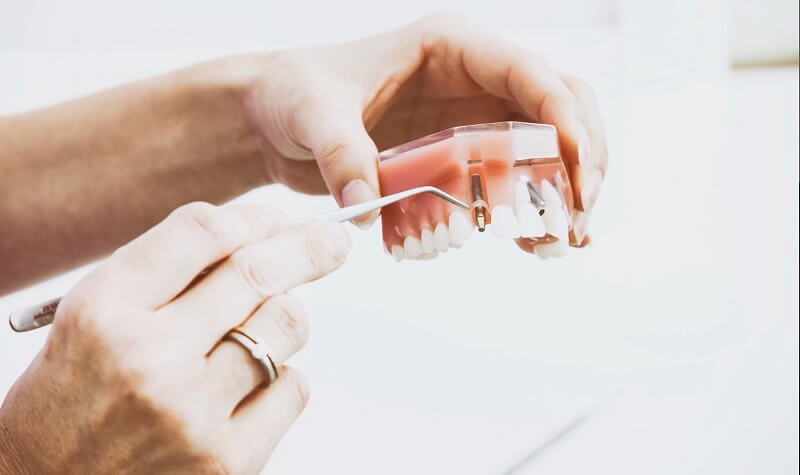Does your dental insurance cover the cost of dental implants? This is a crucial question for anyone considering this important dental procedure. The answer, however, isn’t always straightforward. Coverage for dental implants varies significantly between different insurance plans and providers.
In this comprehensive guide, you’ll learn how dental insurance policies handle dental implants. We’ll explore whether health insurances cover implants, how insurance policies work, what is typically covered, and how you can determine your coverage. Armed with this knowledge, you can approach the decision of getting dental implants with greater confidence and clarity.
Key Takeaways
- Dental insurance may cover dental implant costs depending on coverage and reason for needing them.
- Health insurance may cover implants if medically necessary due to certain conditions or treatments.
- Coverage for implants varies by type of dental insurance plan.
- Dental insurance plans typically cover preventive care, restorative care, surgery, and orthodontics, but coverage varies.
- Implants cost more initially but have a longer lifespan and require less maintenance, making them a better long-term investment.
Does Health Insurance Cover Dental?
Because not everyone has dental insurance, many often wonder if their health insurance will cover the cost of dental implants procedures. The fact is, if you can prove that your need for dental implants is medically necessary, then many health insurance companies will cover the cost of your implants. There are many cases when dental implants are considered medically necessary including:
-
- Implants are designed to prevent further bone atrophy caused by conditions such as osteoporosis, digestive disorders, or diabetes.
- To restore chewing function after a serious injury to the jaw and teeth.
- Replace teeth damaged by radiation treatments for cancer of the head, jawbone, and neck.
- When your chewing is affected to the point it worsens digestive disorders such as ulcerative colitis.
- When certain medical conditions or medications caused dry mouth that ultimately led to tooth decay and loss.
If your need for dental implants falls under one of these categories, your oral surgeon may be able to apply to your health insurance carrier for dental implant coverage.
How Does Dental Insurance Work?
Dental insurance is a form of coverage that helps you manage the costs associated with maintaining good oral health. It functions similarly to medical insurance, but it’s important to understand its unique features.
Premiums
The cost of dental insurance is often paid through monthly premiums. These payments are determined by several factors such as your age, location, and the type of plan you choose. The more comprehensive your coverage, the higher your premium will likely be.
Deductibles
A deductible is an amount you must pay out-of-pocket before your dental insurance begins covering services. For instance, if your deductible is $500 per year and you need a procedure costing $600 early in the year, then you would have to pay for this expense until reaching that limit.
Coverage Limits
Most dental plans come with annual maximum limits on how much they will cover for procedures within one calendar year. Once this limit has been reached any additional costs will fall entirely onto you until the new policy period starts again next year.
Types of Dental Insurance Plans
If you’re considering dental procedures like dental implants, it’s important to understand the different types of dental insurance plans available. These include Health Maintenance Organization (HMO) plans, Preferred Provider Organization (PPO) plans, and indemnity or fee-for-service plans.
HMO Dental Plans
In an HMO plan, you are required to select a primary care dentist from within the network who will manage your overall oral health. This type of plan usually has lower premiums but offers less flexibility as you must stay within the designated network for all services unless in case of emergency. However, they often cover preventative carefully and offer low co-pays for other treatments.
PPO Dental Plans
A PPO plan gives more freedom when choosing a dentist or specialist compared to an HMO plan. While there is still a preferred network that provides services at discounted rates, patients can also visit out-of-network providers with some level of coverage. Note though that using out-of-network dentists typically means higher costs out-of-pocket.
Indemnity Dental Plans
The most flexible option is the indemnity or fee-for-service dental insurance plan which allows patients to choose any provider without affecting their coverage levels. The insurer pays a percentage of charges after deductibles have been met while the patient covers the rest directly with their chosen provider.
Determining whether these insurance options cover specific procedures such as dental implants will depend on individual policy terms and conditions. It’s crucial to review your plan details or consult with your insurance provider before undergoing any dental procedures.

Types of Dental Coverage
The type of dental insurance you have can also affect your potential for coverage. In some cases, your medical coverage may include dental care. However, these plans may only cover preventive care and not major care. Stand-alone plans often offer more flexibility regarding major dental care, such as dental implants. When considering dental implants, it is important to talk with your insurance carrier to find out what they cover.
1. Preventive Care
Preventive care, such as routine office visits and professional cleanings, is almost always covered by dental insurance plans. Routine preventive care helps to ensure your teeth and gums are healthy and reduces the chance of needing more expensive care, such as fillings, root canals, or other costly dental work. In the long run, preventive care saves you and your insurance money, so many plans cover these visits 100%.
2. Root Canals
Root canals help to preserve the structure and functionality of badly damaged teeth. This helps to maintain efficient chewing ability, maintain bone structure and tooth alignment, and help to protect your other teeth from excessive strain.
3. Basic Restorative Care
Basic restorative care covers procedures such as fillings and crowns, to restore the structure and functionality of your tooth. This helps to reduce your risk of needing more major dental procedures down the road.
4. Oral Surgery
Oral surgery is a major dental procedure covered by insurance in the cases of things like tooth extractions, tissue biopsies, drainage of bacterial infections of the mouth, and, in some cases, the placement of dental implants.
5. Prosthodontics
Prosthodontics is the area of dentistry that focuses on the restoration of broken, decayed, and lost teeth. This can include anything from bridges and crowns to dentures and dental implants.
6. Periodontics
Periodontal disease, or gum disease, is the most common cause of tooth loss in America. Many insurance companies cover periodontic procedures, such as scaling, root planning, gum grafting, and periodontal surgery to restore oral health and reduce the risk of tooth decay and loss.
7. Orthodontics
Many insurance carriers will cover orthodontics when it is necessary for function. If purely cosmetic, not all policies will cover treatments such as aligners, braces, palatal expanders, and retainers. If necessary to adjust a problematic bite, most insurance plans will cover orthodontics.

Does dental insurance cover dental implants?
Whether dental insurance will cover dental implants depends on what your insurance coverage provides as well as what the reason is for your dental implants. In some cases, you may not be able to cover the implants themselves, but your insurance may cover the extractions to remove the damaged teeth, or the crowns used to attach to the dental implants. When considering dental implants, it is important to talk with your insurance provider and explore all options.
Further reading:
Dental Insurance Tips: Maximizing Your Insurance Benefits in Edmonds
Why are Tooth Implants Expensive?
Dental implants are a more costly tooth replacement alternative initially than other standard tooth replacement options. However, there are some things to consider. When you look at the alternatives, dental bridges or dentures, these options are typically cheaper at initial placement. However, they require special maintenance (specialized cleaners and adhesives for dentures) throughout their lifetime, adding additional costs. In addition, these restorative treatment options have a lifespan of five to 15 years, meaning they will need eventual replacement. Dental implants require no special treatment (you simply brush and care for them like your natural teeth) and typically last for your lifetime.
The cost of dental implants will also depend on your needs and health. In many cases, you may need additional procedures, such as bone grafts, to provide the jaw stabilization necessary to support the dental implants.
Dental Insurance Can Help You Cover the Cost of Dental Implants
Understanding your dental insurance coverage for implants can be a bit tricky, but it’s a crucial step in your dental care journey. Remember, each insurance plan is unique, so it’s important to dive into the specifics of your policy. Dental implants are more than just a cosmetic enhancement; they are a long-term investment in your oral health. By thoroughly discussing your coverage options with your dental care provider and insurance company, you can make an informed decision about this important procedure.
While the cost of dental implants might initially seem overwhelming, remember that they offer lasting benefits. Be proactive in asking questions and exploring all available options, including both dental and medical insurance coverage. With the right approach and understanding, you can find a way to make dental implants a feasible and rewarding choice for your oral health needs.
Take the Next Step with Soundview Family Dental
While not all insurance providers will cover dental implants, there is the possibility. It all depends on the reasons behind your dental implants and the coverage you have available. At Soundview Family Dental, we understand how stressful dental implant procedures and dealing with insurance can be. Our team of professionals is here to help ensure you get the quality care you need and the coverage you are eligible for.
Don’t let the complexities of insurance deter you from achieving the smile you deserve. Give us a call at (425) 563-6360 or contact us today, and let’s discuss how we can make dental implants work for you. Your journey to a healthier, happier smile starts here!


